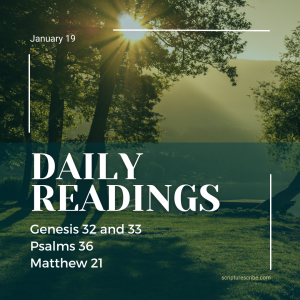
2 days ago
Thoughts on the readings for January 19th (Genesis 32, 33; Psalm 36; Matthew 21).
Thoughts on the readings for January 19th (Genesis 32, 33; Psalm 36; Matthew 21).
Jacob in Genesis 32 journeyed to Bethel. As he did so he noticed that journeying alongside Jacob’s was a troop of angels. Jacob named the place Mahanaim (meaning “two companies”). It was a reassurance to Jacob that the God of Bethel was always with him, as He promised in Genesis 28. Jacob next hears the disturbing news that Esau, with 400 armed men, is coming to meet him. Jacob becomes gripped with fear as his mind went back to the hostility with which they had parted. Jacob makes plans for his family’s protection and an attempt to placate his brother, Esau, with great material gifts. After doing all he could Jacob stayed behind to humbly beseech help from his God. And in response the God (El – strength) of Bethel sends his angel who wrestled all night with Jacob. The Almighty withheld the angel’s might, so that neither Jacob nor the angel were able to prevail. At some stage of the contest Jacob realised that he was contending with an angel. At this point Jacob refused to release the angel until he was granted a blessing. The angel changed Jacob’s name to Israel (“a prince with God”) and smote the hollow of Jacob’s thigh, leaving him with a permanent limp; and a reminder that in order to prevail (with God and men) he must always trust that the LORD can do, when we cannot. At sunrise the angel let Jacob go. It was too late for Jacob to catch up with his family; whose fate was in the hand of the Almighty. Hosea tells us that it was here in Bethel that Jacob found God at last; and is so able to teach us. Slowly read aloud Hosea 12 verse 2-6 and pause and ponder. Note also that when Israel brought their tithes and first fruits to the priest they were to say aloud the words of Deuteronomy 26 verse 5. In chapter 33 the twin brothers meet. Jacob found that the expected hostility was not there. Jacob’s Sovereign had preserved him and fulfilled the promise of chapter 28. Jacob tried to give his gifts to Esau, who didn’t want them. Esau asks Jacob to come with him to Petra. Jacob insists that his brother go ahead and they will follow at a slower pace. Jacob never made that journey but went to Succoth (meaning “booths”). They constructed booths and dwelt there. Jacob then came to Shechem, where he purchased the land that his grandfather Abraham had purchased long ago. Jacob built an altar in thanksgiving to his Sovereign; and named that altar – God the God of Israel.
Psalm 36 is from the pen of David. The choirmaster is told to celebrate the steadfast loving kindness of Yahweh. Verse 1 tells us why the wicked act the way that they do – “there is no fear of God before their eyes” (cp Romans 3 verse18, which is the 7th consecutive quote from the Old Testament showing the perversity of human nature). Verses 2-4 of Psalm 36 speak of the arrogance and calculated plotting of the wicked against the upright. From verses 5-10 David speaks of his confidence in Yahweh’s steadfast love and righteousness. Those who have received it know of the benefits that come to those who faithfully trust in the LORD. Meditate the power of verse 9 – “with you (God) is the fountain of life; in your light do we see light” (ESV). The Father alone is eternal and not created. All life has come from Him. Verse 10 is a plea for the Creator to maintain that love for His children. Verses 11-12 is a call for the Omnipotent to silence once and for all time the arrogant.
In Matthew 21 Jesus’ triumphant entry into Jerusalem was accompanied by shouts of “Hosannah” – meaning save now. Matthew tells us that this was in fulfilment of the prophecy of Zechariah, in the 9th chapter. The prophecy of Zechariah contrasts the arrogant Alexander the Great, bringing death and destruction; with Jesus the lowly bring salvation. The next citation in Matthew – “Blessed is he that comes in the name of the LORD” ie Yahweh – comes from Psalm 118 verse 26 (but note Messiah’s mindset from the context of the entire Psalm). Proverbs 16 verse 32 insightfully says: “Better is he who rules his own spirit than he who takes a city”. The rulers were in indignation with the multitude and asked Jesus to rebuke them. Our Lord’s response was to refer them to Psalm 8 the LXX version, which spoke of what was happening and the victory being accomplished. Next in the chapter came the curse of a fig tree, which like Israel, showed the false promise of apparent fruitfulness. It was cursed by Jesus. The next day the disciples witnessed that the tree had immediately withered. This was followed by Jesus’ demonstration that his authority was unquestionably from God. After this came the parable of the two sons – firstly the rulers said that they were doing the Father’s will, but lied, in contrast the commoners knew they were sinners but they sincerely repented. Lastly the chapter concludes with the parable of the unfaithful tenants. The rulers recognising themselves in the story fulfilled it to the letter by immediately taking counsel to destroy Jesus.
Comments (0)
To leave or reply to comments, please download free Podbean or
No Comments
To leave or reply to comments,
please download free Podbean App.